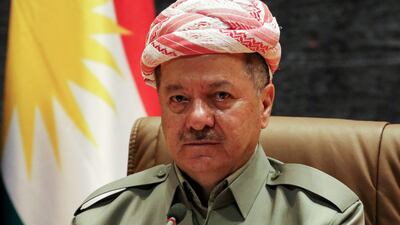A TV executive in Iraq’s Kurdish region has launched an unexpected domestic push for a “no” vote in an independence referendum next month.
Shaswar Abdulwahid Qadir, owner of NRT Television - one of the biggest media organisations in Kurdish Iraq, launched the “No for Now” campaign this week.
The campaign believes the September 25 referendum, which is opposed by the central Iraqi government in Baghdad, will not serve the interests of the Kurdish population.
“Any successful referendum should have several preconditions, including the support of Iraq, Iran, and Turkey, as well as the United States,” Mr Qadir said, when he announced his intention to oppose independence last month.
The referendum is also opposed by the key international supporters of the Kurdish region, including turkey Turkey, Iran and Germany and, to a lesser extent, the US.
They are fearful of the implications that such a move comes at a time when regional rivalries are at their height.
President of the autonomous Kurdish region Masoud Barazani announced in June the referendum would take place and it is expected to be an overwhelming vote in favour of full independence from Iraq. An informal referendum in 2005 alongside the parliamentary elections, claimed the “yes” vote won by 98.9 per cent.
But the launch of the “no for now” campaign suggests it may not be as straight a forward victory as previously thought.
“The referendum will not be a step forward towards building an independent and democratic state. It’s a historical and dangerous mistake,” Rabun Maruf, a spokesperson for the campaign, said on Tuesday, during the launch event in the
The campaign also announced that it will broadcast its own television channel called “No for Now”, urging the Kurdish population to vote “no” while arguing that timing is “not suitable”.
Hiwa Osman, an analyst and commentator on Iraq and Kurdistan, said it would be unusual and unprecedented for Kurdish society to listen to be swayed by the campaign.
Although the “’No’ campaign can be influential, it is not stronger than the will of the political parties of Kurdistan”, he said.
In response to the campaign launch, Mr Barazani said: “those who asked to postpone the referendum must show an alternative”.
“If they don't have a stronger alternative, we cannot postpone and will not,” said Hemin Haearami, a senior adviser to Mr Barzani.
In Baghdad, anger is growing over the referendum. “That relationship between Baghdad and Erbil is determined by the Iraqi constitution and the Kurds cannot act unilaterally,” a government spokesperson said in June.
“Any decision that concerns the future of Iraq must take into consideration the Iraqi constitution as it is an Iraqi decision” Saad Al Hadithi, spokesman for prime Minister Haidar Al Abadi, said.
The US state department has also voiced its concern that a non-binding independence referendum will be a distraction from "more urgent priorities" such as the defeat of ISIL.
While saying it appreciated the "legitimate aspirations" of the people of Iraqi Kurdistan, the state department said it supports a "unified, federal, stable and democratic Iraq" and had voiced concerns to Kurdish authorities.
"We ... encourage the regional authorities to engage with the government of Iraq on the full range of important issues, including the future of relations between Baghdad and Erbil, on the bases of the Iraqi constitution," the department said.
Ankara has described the referendum to be “irresponsible”, stressing that it is not within the interests of Iraq or that of the Kurdish Regional Government.
“We believe that this decision is wrong and lacks responsibly, it will also be followed by many problems” Binali Yildirim, the Turkish prime minister, said.
Germany has also warned that the independence could exacerbate further tensions in Iraq.
The foreign minister, Sigmar Gabriel, said: “we can only warn against one-sided steps on this issue. The unity of Iraq is on the line.
"Redrawing the lines of the state is not the right way and could exacerbate an already difficult and unstable situation, in Erbil as well as Baghdad”.
Mr Gabriel urged that unity must be maintained in Iraq to empower the continued battle against ISIL.
“The fight against ISIL has not yet been won. Only together will it be possible to take the next and perhaps most important steps to deal with the challenges to come," he said.


